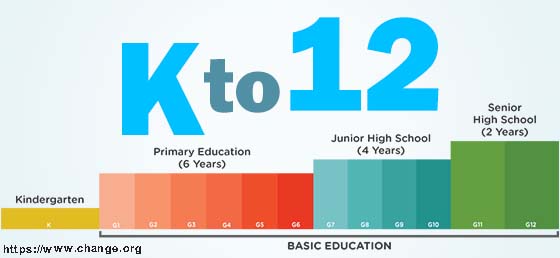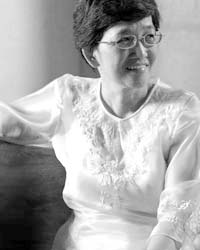The senior high school program rolled out this school opening to mixed reviews. I believe, though, the K-12 program mandated by the 2103 Enhanced Basic Education Law, which prescribes two additional years in high school, is necessary and will, in the end, redound to the benefit of Filipino college graduates.
Until basic education was lengthened to 12 years, the Philippines had been the last country in Asia and one of only three countries in the world (the others are Angola and Djibouti) with a 10-year pre-university cycle. Today, the Philippines has six years of elementary education, four years of junior high school and two years of senior high.
In and outside the country, the previous four-year high school education was causing difficulty for our college graduates. Multinational companies operating in the Philippines find them too young and unprepared to handle responsibilities. Overseas, many of them are asked to pass equivalency exams before being accepted for graduate and postgraduate studies. Our licensed professionals are considered only as good as “technicians” in most developed countries. Even after taking review classes, many struggle to pass professional board exams abroad.
No doubt a lot of problems and challenges accompany the beginning of the nationwide implementation of senior high school – the multi-track curricula, textbooks, classrooms, school desks and teachers. These certainly must be addressed, but asking government to suspend the implementation of the law is not a solution.
One challenge, which should have been easy to address but has not been adequately done, is informing parents how the K-12 program will help their children land jobs immediately after senior high school. Parents need to be told that the sacrifices they believe they are being asked to make are not as terrible as they think they are.
Parents of incoming Grade 11 students I spoke to say the school did not prepare them on what to expect in the additional two years, the options they have if they cannot afford it and how they can guide their children in choosing the tracks to enroll in. Senior high school offers four tracks: academic, technical-vocational livelihood, sports and arts and design. But many of these parents do have a one-track mind. “Dapat tapos na ng high school ang anak ko at makakatulong na sa amin, ngayon, ‘pag ‘di kami nagpatuloy, high school dropout ang turing sa kanya,”our laundrywoman said.
Poor Filipinos like her, especially in the provinces, will indeed be hard up to send their children through senior high school. Free tuition in public schools and the voucher system in private schools are fine, but there are other attendant costs such as food, transportation, supplies and school projects.
I can only imagine the financial burden the additional two years will add to the students from impoverished families. But I hope both the students and the parents would realize that senior high school is roughly the equivalent of the two-year general education or GE program currently offered in colleges and universities. (The revised GE program in colleges and universities will take effect in 2018, just in time the first batch of senior high school graduates.)

Teachers and textbooks
Educators who are seeking the suspension of the K-12 law cite major deficiencies in two areas: the preparedness, even the quality, of the teachers and the quality of the textbooks. They claim that we are not K-12 ready. The teachers are not prepared, classrooms are inadequate and textbooks are not ready.
Reviewers who have seen the mathematics and science content in the proposed textbooks shake their heads in frustration.The textbook review was done in haste, with not enough time allotted for thorough fact-checking, because of the urgency of catching up with printing schedules to ensure that schoolchildren will have textbooks when classes open.
An educator friend from the University of the Philippines lamented that even if students are able to finish 12 years of pre-university education and meet the ASEAN and other international standards in terms of form, there arises the question of their mastery of content. Will they have gained the requisite education, training and skills envisioned in an ideal K-12, given all the challenges (teachers and textbooks)? How will they fare in the competitive outside world?
While the Department of Education looks for competent teachers to handle the two years of senior high school, some private school teachers lament their early retirement or forced early separation from schools where they have devoted decades of their lives.
One such school is Miriam College. Prof Rebecca T. Añonuevo writes: “Last week, 21 GE faculty members teaching Filipino, literature, philosophy, science, math, Rizal, history, physical education and theology, among other subjects, received our Notice of Separation to take effect on June 13, 2016. Miriam College is showing the door to GE faculty with top credentials and performance ratings, using retrenchment as ground for dismissal. But at the same time, it has applied for another round of tuition increase with the Commission on Higher Education because it promises, among other improvements, to upgrade its programs for faculty and the quality of education for the sake of its students.”
Many other private schools are in the same boat. They are dependent on tuition. Revenues have dropped because there are very, very few college enrollees starting this year until 2018 with the implementation of senior high. Fortunately, faculty members of state-owned colleges and universities are spared of retrenchment.
Censored president
My favorite description of president-elect Rodrigo Duterte is from political science professor and analyst Julio Teehankee who noted Duterte’s penchant for coarse, bombastic and uncensored language as “the emergence of a maverick president that is tailor-fitted for reality TV and the social media.”
United Nations Secretary-General Ban Ki-moon, meanwhile, has strongly condemned Duterte’s apparent support of extrajudicial killings, voicing particular concern over his comments about corrupt journalists who deserve to be killed. “I unequivocally condemn his apparent endorsement of extrajudicial killings, which is illegal and a breach of fundamental rights and freedoms,” Ban said in a statement.
Duterte and his allies have asked us to watch out for his metamorphosis after he is sworn in. I’d like to be proven wrong in my belief that it is his nature to be coarse, vulgar and disrespectful of other people’s sensibilities. After all, he has said on the campaign trail that what we see is what we get. I doubt if someone can tell him that we are all sons and daughters of our mothers, and peppering his language with “sons of bitches” in English or Filipino reflects his upbringing.
The most telling of the kind of leader we will get is his tirade against the local journalist, who questioned him about his health and asked to see his medical certificate.
Duterte accused him of “impertinence” and compared his question to asking about his wife’s private parts. That he lambasted the wrong journalist was bad enough, but worse was his view of what constitutes pertinent and relevant question.
If a sitting president doesn’t think his health is of vital importance to the public, what then constitutes vital and acceptable question? Aren’t his actions tantamount to muzzling the press? — First published in Tulay Fortnightly, Chinese-Filipino Digest 29, nos. 1-2 (June 21-July 4, 2016): 5.
